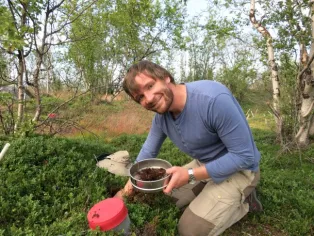GRAND CHALLENGE: the Carbon Cycle Response to Anthropogenic and Biophysical Drivers
– Scratching the Surface
In the Spotlight: Fundamental Research for Keeping Carbon in the Ground
BECC’s role in fostering successful young researchers
Soils store more carbon than the atmosphere and living biomass together, making carbon compounds entering or leaving the soil carbon storage system of considerable importance for greenhouse effect mitigation. As a result, soil microbial ecology and chemistry play a major role in the global carbon cycle and is a research area with many knowledge gaps to fill. The Microbial Ecology Group at the Department of Biology at LU has been successful in advancing their science towards the needs of society, performing excellent science, receiving large grants, growing in numbers, exploring new methods and techniques, and building networks. During the last 10 years 9 young researchers have developed into fully fletched research leaders with their own labs. When looking back, it is possible to discern the role played by BECC as a long-term and supporting research structure, bringing postdocs and PhD students to the research environment, strengthening talented researchers with different kinds of competitive funding, and platforms for networking and idea generation.
Edith Hammer, senior lecturer
In her research, she examines the soil organisms’ role in sequestering and stabilising or decomposing soil organic matter. A long-term aim is to provide knowledge on how different land-use methods affect the microorganisms in the soil and their ability to store carbon in the ground.
In 2020 she was awarded a Future Research Leader grant of the Foundation of Strategic Research project ”A window to the soil: Microchips reveal Soil Carbon dynamics” in which she uses microchips developed by her research group, to understand how organic matter is distributed and stored in the soil at the scale of the microorganisms.
Edith received funding for her first postdoc from a BECC call in 2017. The position was awarded Dr Milda Pucetaite, who in 2023 received an ERC starting grant to continue disentangling the microscale chemistry of complex biotic and abiotic microbial interactions by taking use of advanced microspectroscopy methods and at synchrotron facilities (MAX IV Laboratory), at LU and elsewhere. Closing the circle, Milda recently was also awarded a postdoc by BECC.
Johannes Rousk, Professor
Being an active member of BECC since the start, Johannes has had the opportunity to utilise the benefits of belonging to a long-term research environment. He has been an active force in tightening the bonds between the complementary knowledge of soil ecology and modelling.
In his lab, the focus is to study the ecology of microorganisms in natural and managed soil systems and how these organisms drive the biogeochemistry of soils. Of specific interest are the factors that influence microbial growth and their activity driving the nutrient cycles, for example changes in temperature and water conditions. A Wallenberg Academy Fellow award has allowed him to continue his curiosity-driven research and delve into how the microorganism turnover of carbon is affected by changes in environmental conditions including their potential adaptation to these new conditions. Such results can help improve models used by IPCC.
Suggested reading, listening and watching
- Johannes is one of the most cited researchers in the world - biology.lu.se
- Vacuum cleaner-effect in fungi can hold nanoplastics at bay - biology.lu.se
- Edith Hammer: Carbon Cycle and Climate Change - Canvas Studio
- Welcome to Soilwatching - YouTube
- They recreate the soil's structure to understand carbon storage! - YouTube
- BECC guest researcher: Professor Adam Hitchcock - becc.lu.se
- Does Fungi Break Down Organic Matter? | The Decomposition Process - findinggeniuspodcast.com)
In Swedish
In the Spotlight: Research Infrastructures for Observation of Climate Gases and for Contributing to International Evaluations
The Integrated Carbon Observation System (ICOS)
ICOS Sweden is a distributed national research infrastructure, which in turn is part of a large European research infrastructure that provides continuous high-quality data to enhance our understanding of sinks and emissions of greenhouse gases, providing a knowledge base for necessary climate action. Nationally, scientific knowledge emanating from ICOS will support the Swedish
Climate Policy Framework aiming for net zero GHG emission in 2045. Equipment and operation of ICOS Sweden are jointly funded by the Swedish Research Council and participating parties, which also includes BECC. Several BECC researchers use the open data to, for example: understand and evaluate constraints on terrestrial carbon cycling, determine sources and sinks of greenhouse gases, effects of drought on the carbon uptake, and more. LU is responsible for the atmosphere and ecosystem stations at Hyltemossa in Skåne and Norunda in Uppland, and UGOT for the Skogaryd research catchment, with BECC researchers in leading positions. BECC researcher Dr Jutta Holst at the Department of Physical Geography and Ecosystem Science (INES), is the ICOS Sweden Focal Point.
BECC’s input to international climate reports: The Lund-Potsdam-Jena General Ecosystem Simulator (LPJ-GUESS)
The earth system model LPJ-GUESS was first developed in the late 1990's and is a process-based dynamic vegetation-terrestrial ecosystem model designed for regional or global studies. It provides the biosphere component of Swedish data in models, such as EC-EARTH, that contribute to international evaluations, the most well-known being climate-related reports published by IPCC. It can predict structural, compositional, and functional properties of the ecosystems of major climate zones of the Earth, and outputs include vegetation composition and cover, biomass and soil organic matter, carbon pools, leaf area index, net primary production, net ecosystem carbon balance, carbon emissions from wildfires, biogenic volatile organic compounds, evapotranspiration, runoff, and nitrogen pools and fluxes.
At LU, LPJ-GUESS has a particularly advanced representation of forest demography, but also of anthropogenic land-uses such as croplands, pastures, and managed forests, with the ambition to have better and more robust representation of biodiversity’s role in the climate system. Recent components developed include methane emissions, soil nitrogen chemistry, permafrost dynamics, and a new wildfire model. The development at LU is a close collaboration between researchers of BECC and our sister SRA MERGE (ModElling the Regional and Global Earth System), for example our environments co-fund senior lecturer Thomas Pugh at INES. Recently LPJ-GUESS has also become an infrastructure that connects researchers at LU and UGOT.
Suggested reading, listening and watching
- New study: Envisioning sustainable carbon sequestration in Swedish farmland - lucsus.lu.se
- Recent study reveals sub-seasonal drought sensitivity across Europe - nateko.lu.se
- Increased carbon dioxide release from ecosystems despite of negative temperature trends - nateko.lu.se
- Congratulations to ICOS! - cec.lu.se
- LPJ-GUESS home page at Lund University
In Swedish
- Skogaryd forskningsstation - gu.se
- Trädplantering inte alltid en effektiv kolfälla - gu.se
- Nord Streamgasen drar in över Skåne: Mätt väldigt höga koncentrationer - sverigesradio.se
- Torkan minskar skogens koldioxidupptag – forskare följer utvecklingen i Hyltemossa - svt.se
- Så förändrar klimatförändringar världens skogar - svt.se
- Torkan minskar skogens koldioxidupptag – forskare följer utvecklingen i Hyltemossa - svt.se
In the Spotlight: Involvement in IPCC
Several BECC researchers have over the years been involved in the production of IPCC reports acting as experts, chapter authors, involved in overall summaries and the like. Such work is valuable not only for the product, but for bringing an understanding of international processes to colleagues, and not the least for the individual researcher to expand his/her collaboration with international top scientists. In 2023, Professor Deliang Chen at the Department of Earth Sciences at UGOT was one of the coordinating main authors of the IPCC Summary for All report. In connection to that, he and others were tasked to write a popular science report on climate change for the Swedish Royal Academy of Sciences.



